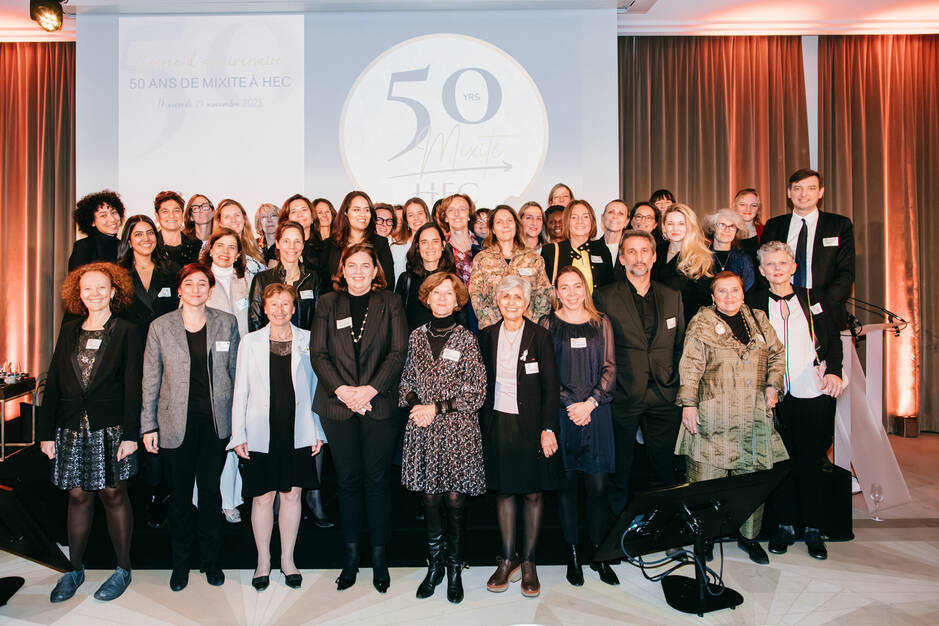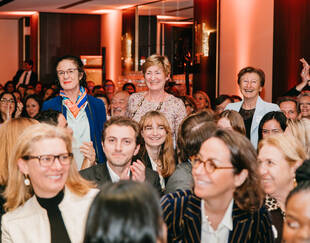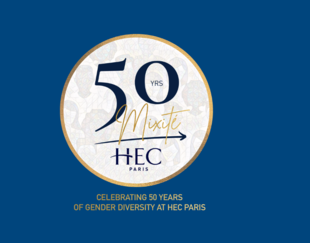"Gender equality would generate $28,000 billion worldwide"
On November 29, 2023, the 50th anniversary of gender mixity at HEC Paris was celebrated by the school, the alumni association and the HEC We&Men alumni club in the presence of three French ministers, in front of over 300 graduates, students and staff at the Pavillon Dauphine. The occasion provided an opportunity to take a look at past initiatives, the economic potential represented by gender equality and the concrete actions to be put in place for a more equitable and sustainable approach to parity.

1973-2023 : 50 rôles modèles féminins mis à l’honneur pour les 50 ans de la mixité à HEC Paris
Auteur/Author of this article: Frédéric Voirin
28,000 billion dollars! That's the figure that would be generated in the world by gender equality, according to the Sista women's entrepreneurs' collective, and which HEC Alumni president Adrien Couret echoed in his speech at HEC's 50 years of co-education evening. A statistic that did not leave the audience unmoved: "That's it, we've found the solution to more growth: we need more women!" launched Hedwige Chevrillon (MBA 84), editor-in-chief of BFM Business and moderator of the panel.
28,000 billion dollars also tells us how far we have to go. Less than 4% of women hold executive positions in CAC 40 companies, and there is only one woman at the helm of a Next40 2023 company published by French Tech. Another gap to be bridged is that only 2% of global funds invested in start-ups go to those founded by women.
To bring change, the Sista collective ran a shock operation on LinkedIn on March 8, 2023, proposing that a number of male personalities with a strong following, including Eloïc Peyrache, entrust their profile to a female entrepreneur, in order to give greater visibility to women in tech.
Gender diversity, a source of competitiveness for companies
Also present on stage at this anniversary of gender diversity at HEC, Agnès Pannier-Runacher (H.95), Minister for Energy Transition, is very clear on the competitive advantage of an inclusive economy. "Macroeconomics says unambiguously that inclusion is a factor in a country's competitiveness. So yes, the role of women needs to be developed to drive national and international growth".
Alongside her, Bérengère Couillard, Minister Delegate to the Prime Minister, in charge of Equality between Women and Men and the Fight against Discrimination, expresses concern about the shortage of female profiles in the technology sector - where European female employees account for just 22% of jobs - and adds: "France will not be competitive, particularly internationally, without women in Tech." Her words echo the recent WomenInTech incentive conference held by the Hi!Paris center and various testimonials from female Tech professionals who came to HEC Paris during the Digital & Tech Fair 2023.
"The role of women needs to be developed to drive national and international growth".
More women in management positions and throughout the whole economy
The same is true of microeconomics. Agnès Pannier-Runacher points out that "executive committees diversified by gender, social origins, but also by people from different educational backgrounds - faculty, private school, apprenticeship or professional career - perform much better than those composed in the inter-social circle."
As a case in point, Valérie Baudson (H.95), CEO of Amundi, Europe's second-largest asset management company, which manages almost 2,000 billion euros worldwide, points out that "diversity in general, and gender diversity in particular, are a source of performance for companies. Our Strategy Committee systematically votes against board renewals in companies that do not advocate gender diversity."
"Diversified executive committees perform much better than those composed in a homogeneous circle."
"In France, we're good at making laws for women, but less good at giving them a real place," recalls his colleague Roland Lescure, Minister Delegate for Industry, also invited on stage for the event. Following his reflections, the audience bounced back to the factor of legal action in the general interest.
The possibility of extending the Copé-Zimmerman law beyond boards of directors to rebalance management committees on a parity basis, but also all employees in the public and private sectors, is legitimately proposed in the audience.
Equal pay, mentoring and bias reduction, 3 factors to act on for gender equality
Equal pay
According to Bérengère Couillard, the first objective indicator on which companies can take action is equal pay. Indeed, despite the Roudy law on professional equality enacted in France in 1983, "a gap of 4.2% persists between men's and women's salaries" even in 2023. Companies must therefore be encouraged to close this gap.
"A 4.2% gap between men's and women's salaries will still exist in 2023".
Mentoring
The second concrete factor of commitment to women is the development of mentoring. Via various professional support groups (IndustriElles, Les femmes de la Tech, Elles Bougent), the government hopes to reach 100,000 women mentored by 2027 in France.
The three ministers present are inviting all HEC alumni and staff present at the ceremony to come and share their experiences with the women mentees.
Third factor of influence: reducing cognitive biases.
Éric Lombard (H.81) confirms that it still takes a long time to implement gender equality initiatives in companies. The head of the Caisse des Dépôts and a driving force behind changes in the way top executives are appointed, announces that he has been working on biases in job interviews. "Caisse des Dépôts has decided to make 2024 the year of parity," he says, pointing out that his Comex is made up egally of men and women. "And I can tell you, that's six years' work!"
Gender biases still persist on a large scale
According to the recent findings of the gender stereotypes barometer of the French association of diversity managers and the Higher Education Conference (Conférence des Grandes Ecoles), 80.1% of students surveyed consider that "men and women possess identical skills and professional qualities", yet "60.5% cite at least one skill as more feminine or more masculine."
The same problem of gender bias was found in the previous generation: according to the IPSOS-Epitech study on how girls and boys choose digital careers, "only 33% of girls are encouraged by their parents to choose digital careers, compared to 61% of boys". This confirms that gender bias permeates the projections we make for our children and the ways we support their orientation.
"Only 33% of girls are encouraged by their parents to go into the digital professions, compared with 61% of boys".
In the same study, we learn that "while 56% of high school girls are interested in IT, only 37% are thinking of studying engineering or computer science". The reason for this is the famous impostor syndrome, the feeling of not being up to the job: "among high school girls with a grade average of at least 14/20, 43% think they are capable of studying computer science, compared to 78% of boys with the same level of education".
Marguerite Gallant (H.03), Director of the HEC Alumni Association, has some very sound advice for young women who want to embark on a career in engineering, tech or business: "Do Maths! It's an objectively assessed subject that will serve you well for the rest of your life.
"Message to all young girls: do Maths! It's an objectively assessed subject that will serve you throughout your life."
Towards even greater solidarity at HEC for disavantaged women
A more general principle of collective responsibility is shared by the audience present at this evening to celebrate 50 years of gender diversity at HEC, to rebuild social ties, give disadvantaged profiles a chance and reunite talents from all backgrounds.
Agnès Pannier-Runacher points out that this last point is fundamental. "We have a responsibility, as privileged people, because 70% of the world's poor are women. How can we ensure that women have self-confidence and access to operational positions, positions in sectors that are presumed to be male, such as industry, science or technology, but also to management positions? This anniversary of gender diversity is an invitation to reflect on the role that HEC can play as people of power, who steer economic activities and can enable others with less power - and women in particular - to have an outstretched hand, to have confidence in themselves, to gain access to a job when they don't necessarily have the best-calibrated CV, to be given a chance to experience their own development. I also believe that this requires mentoring and support for young people. Everyone can do it in their own way, but I think we all have a responsibility, men and women alike, at HEC."
"This anniversary of co-education is an invitation to reflect on the role that HECs can have as people of power, to help disadvantaged people - and women in particular - to have confidence in themselves, to be given a chance again to experience their own development."
This anniversary also saw the official announcement of a new annual full scholarship program offered by the Laidlaw Foundation to 10 women from underprivileged backgrounds to finance their MBA at HEC Paris.
Susanna Kempe, Executive Director of the Laidlaw Foundation, gave a kind account of her motivations. "We know that exceptional women will be able to acquire the skills, knowledge and network they need to build successful careers through HEC. We believe that these scholarships will change the lives of these women and prepare them to be better leaders. This will not only change their lives, but also the world of business: gender diversity in business ensures better, more profitable but also fairer deals."
At her side, Eloïc Peyrache reminds us that "HEC is committed to making an impact, particularly with the social elevator represented by the StandUp program. This free support program has already helped 350 women entrepreneurs from disadvantaged neighborhoods to break into the world of business, and we hope to reach 600 women in the near future."
"Gender diversity in business ensures better, more profitable but also more equitable business."
Beyond the celebration of this anniversary, this evening will have maximized the strengths of the HEC community to raise awareness and pursue concrete actions in favor of gender equality. Reason to be optimistic for the next fifty years? The future will tell, for as the mistress of this ceremony, Hélène Bourbouloux, president of the HEC alumni club We&Men and legal administrator at the head of the FHB law firm, pointed out in saluting the collective and feminist commitment of the ministers present and the HEC team: "the more we project ourselves into a future with shared values, the more likely we are to see it happen."
Related articles

